
THE MEANING ISSUE
First-Year Roommates Dish on Their Dorm-Life Secrets
Engineer? Athlete? Why Not Both! Learn How These Jumbos Make It Work
The Conversation: How the Perseus Project Digitizes the Classics
Hear the Buzz About the Best Coffee Spots Around Campus
THE TUFTS ADMISSIONS MAGAZINE | THE STORIES OF TUFTS, NOT JUST THE STATS
JUMBO
ADMISSIONS.TUFTS.EDU | ISSUE 36 / SUMMER 2024
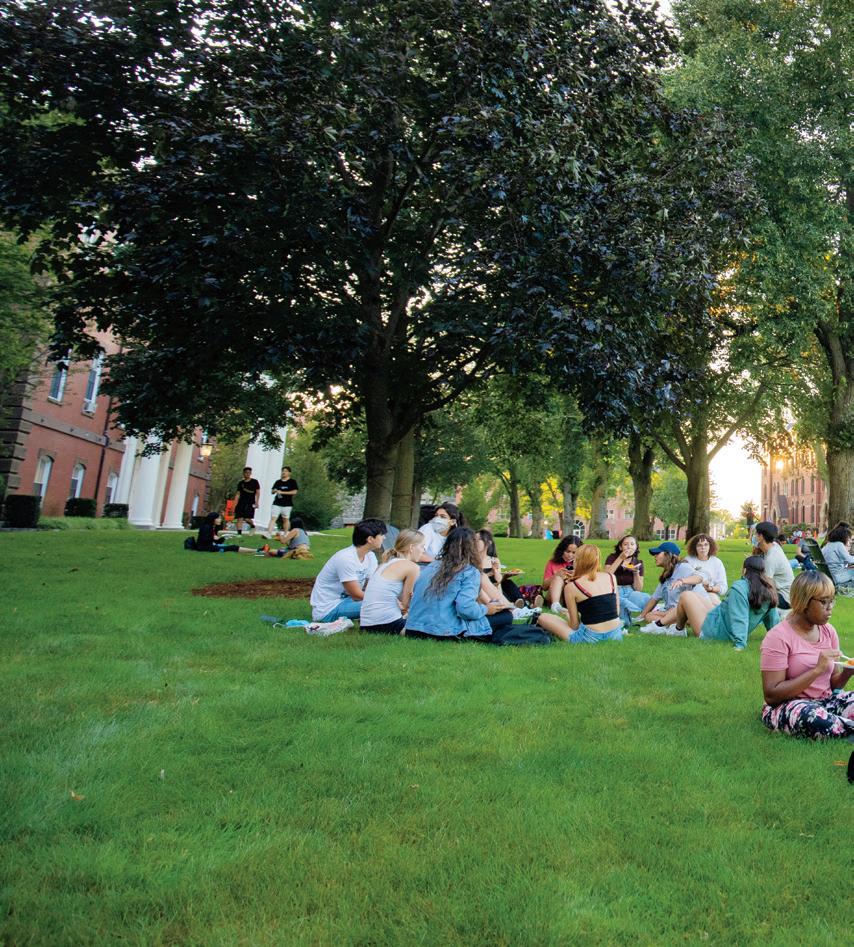
MEET JUMBO
These pages were written by Tufts students. Flipping through them should feel like taking a stroll through campus. You’ll meet professors and students; they’ll share with you what excites them. You’ll drop into a class on an unfamiliar topic and leave inspired, dig into some fascinating research, or hang out in a residence hall with potential classmates. Along the way, you might decide that Tufts feels like the right place for you. If that happens, this magazine is also for you—flip to the back where we’ve broken down the basics on applying: deadlines, financial aid, and our advice. This is Tufts; explore it.

FEATURES
16 | When Students and Faculty Combine Forces in the Classroom Tufts students support their professors, both in and out of the classroom.
24 | A Classic Major Gets a Major Upgrade Towards a more all-encompassing understanding of ancient history.
PHOTO BY JENNA SCHAD/TUFTS UNIVERSITY CONTENTS
On the Cover: Keira Reddy ’25 discusses her journey from South Dakota to Somerville.
3 APPLICATION ADVICE 8 INFOGRAPHIC 20 LIVING 30 ARTS 31 AROUND TOWN 34 ATHLETICS 36 CLASS HIGHLIGHTS 38 ADMISSIONS INFO 39 FINANCIAL AID
COVER PHOTOS BY KATHLEEN DOOHER (FRONT), BOSTON AERIALS (BACK)
FROM THE DEAN

GREETINGS,
The search for a deeper meaning drives the Tufts community.
Our students seek to make an enduring impact during their time at Tufts. They are curious about the world around them, eager to collaborate with their peers and professors, and motivated by making a positive impact on society and its institutions. And when they graduate from Tufts, they have acquired the skills from and have the support of a worldclass institution behind them to make that change a reality.
Jumbos ask big questions, and then use the powerful academic tools of this R1 research university to seek answers. They get involved in the work of the Tisch College of Civic Life, finding purpose in better understanding our democracy so that they can bridge divides and communicate across
differences, from local governments to the United Nations. They access Tufts funding for personal research projects like the Summer Scholars program, where faculty mentorship coupled with intellectual freedom open the door to new understandings of the world. They spend their free time with their friends, shaping their experiences on campus and defining, through their kindness, curiosity, and collaboration, what it means to be a Jumbo.
In this issue, we explore how the Tufts community finds and creates meaning, both on our campus and beyond. You will learn how Keira Reddy ’25 found communities that make Tufts feel like home—even seven states away. You will discover how to help professors improve their classroom experience through the Pedagogical Partnership Program. You will hear from Dayna Cunningham, our esteemed
“THE SEARCH FOR A DEEPER MEANING DRIVES THE TUFTS COMMUNITY.”
Dean of the Tisch College of Civic Life, about what makes Tufts a special place to live, learn, and grow. And you will find your next favorite class through an in-depth dive into some select courses from the Department of Philosophy.
I hope this issue of Jumbo Magazine reveals to you the ways in which you might find and create meaning as a student at Tufts.

Most of what you’re about to read was written by these Tufts students. Listen for their voices as they introduce you to the Tufts community, page by page.
JAY GUO ’24 from West Haven, CT
RUBY MCELHONE YATES ’25 from Easthampton, MA
SHANNON MURPHY ’26 from Melrose, MA
JED QUIAOIT ’25 from San Diego, CA
THE TUFTS ADMISSIONS MAGAZINE
OFFICE OF UNDERGRADUATE ADMISSIONS Tufts University / Bendetson Hall 2 The Green / Medford, MA 02155 617.627.3170
admissions.tufts.edu Produced by the Office of Undergraduate Admissions and Edited by Sam Nicol, Assistant Director of Undergraduate Admissions Design by Hecht/Horton Partners
STUDENT
GROUP
/
MEET THE
COMMUNICATIONS
GREETINGS
BY KATHLEEN DOOHER
PHOTO
MAKING THE MOST OF YOUR CAMPUS VISIT
BY RILEY MYHAVER, ASSISTANT DIRECTOR OF UNDERGRADUATE ADMISSIONS
As you head into the summer, you are likely beginning an exciting stage of your college search process by visiting colleges and universities! While you are visiting schools, you’ll hear tour guides talk about their experiences, which will help you visualize what your life as a student might be like. You’ll also have the opportunity to ask tour guides questions about their experiences. Here is a little advice on which questions to ask, from myself and some of our fabulous Tufts Tour Guides!
From an Admissions Counselor’s perspective, I think there are two categories of questions you can ask:
What is your favorite tradition that takes place on campus?
1
General questions that can help you compare different colleges to each other.
How would you describe the student body here?
2
Could you tell me more about your cognitive and brain sciences major?
School specific questions, asking about a major, program, or tradition.
Which would you say is truly your favorite dining hall, Carmichael or Dewick?
Asking a combination of these two types of questions can allow for you to learn what makes a school unique, and be able to compare colleges to each other.
My favorite question for prospective students to ask is “If you could describe the community here in 3 words, what would that be?” This question allows you to learn more about the whole community at a college or university from the students, to faculty, and staff. To learn more about building your own community here at Tufts, our tour guide Morgan ’24 suggests asking “How did you meet your first friends at Tufts?” Learning more about how students started building their community allows for you to envision yourself as a first-year student and what opportunities there might be on campus.
Besides the community at Tufts, asking students their personal feelings about the school provides
deeper insight on the experiences students have had. Our tour guide Tolulope ’25 enjoys when students ask “What is your favorite and least favorite thing about Tufts?” and “If you could change one thing about Tufts, what would it be?” These questions allow students to hear a realistic perspective on the university and they give tour guides the chance to talk about how Tufts is working to be the best school that it can be.
While these questions are a great place to start, make sure to develop questions that are specific to your interests and goals. Student tour guides love to discuss their experiences with you—they want you to picture yourself on their campus!
3 ADVICE
INSIDE OUT
EXCOLLEGE HIGHLIGHT: PLANTS AND PEOPLE: BRAIDING SWEETGRASS
UNDERGRADUATES at Tufts are able to teach courses of their own design through Tufts’ Experimental College. Today, we want to highlight one for you, straight from the course description. “Have you ever wanted to forage for your own food? Learn how to make paper from plants around you? See
HOW MANY CAMPUSES?
YOU MIGHT know that Tufts has four campuses in Massachusetts: Medford/ Somerville, our health sciences campus in downtown Boston, our SMFA campus in Boston’s Fenway neighborhood, and our veterinary school campus in Grafton. But did you know we also have a campus in the French Alps? The Tufts European Center in Tailloires, France is open year-round, but undergraduates tend to visit during the summer for one of our six-week study abroad programs. Our professors are encouraged to teach place-based courses like Flower of the Alps to make sure Jumbos come away with a unique education.
A REAL YET RANDOM, PLAYFUL YET SERIOUS SPIN AROUND CAMPUS— AND JUST BEYOND
first-hand how maple syrup is made? This course will use Robin Wall Kimmerer’s contemporary classic, Braiding Sweetgrass, as a guide for how to build a stronger relationship with our local ecosystems and gain a deeper appreciation for plants and all they do for us.”

4

A BUSTLING ARTISTIC COMMUNITY
THERE’S NOWHERE quite like the SMFA atrium!
Located centrally in the SMFA, this open, three-story space lets in a lot of light and often has a buzz of activity. You might catch up with a professor, stop by the SMFA art supply store, work on your homework, or eat lunch with friends!
TUFTS NAMED A TOP PRODUCER OF FULLBRIGHT SCHOLARS
TUFTS HAS A LONG HISTORY of making an impact on the world, with civically-engaged and globally-minded alumni changing whatever industry they enter for the better. One great example of this is the number of Fullbright Scholars who graduate from Tufts. After recently being named a top producer of Fullbright Scholars again, with 13 scholars this past year alone, it’s clear just how dedicated Jumbos are to building a better world.
TUFTS STUDENTS PRODUCE FILM ABOUT LITTLE-KNOWN ABOLITIONIST
JUMBOS ARE some of the most curious and interested students you will meet. So when given the opportunity to highlight the life of a little-known abolitionist Ellen Garrison from the greater Boston area, they jumped at the chance. Supported by the Half the History initiative, which was founded by Tufts professors seeking to highlight women’s too often overlooked contributions to history, these Jumbos helped produce a soon-to-bereleased short film.

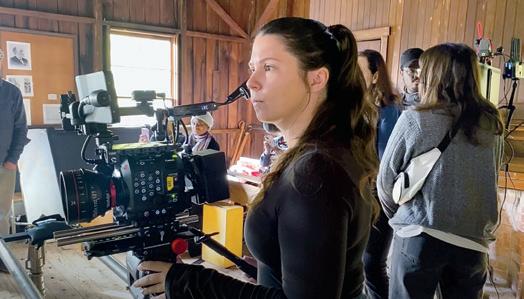
5 SMFA PHOTO BY ALONSO NICHOLS/TUFTS UNIVERSITY; VIDEO STILL FROM LIGHTS, CAMERA, ACTIVISM!

“Tufts
is such an unusual university in its commitment to civic engagement and civic life … It has such faith in the democratic process.”
6
PHOTO BY KATHLEEN DOOHER
DAYNA CUNNINGHAM
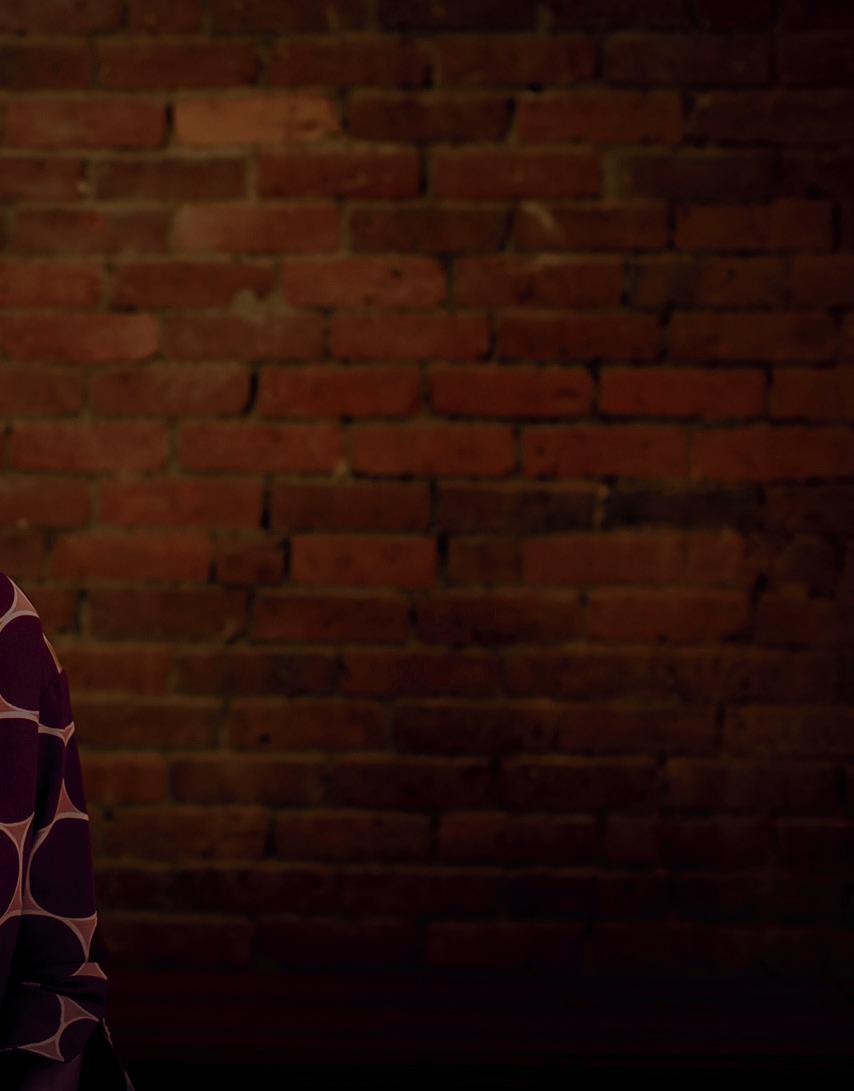
When talking qualifications, you’d be hard pressed to find a candidate as equipped to tackle the work of democracy, civil rights, and community participation as Dayna Cunningham. Having worked as a racial justice and voting rights lawyer for the NAACP Legal Defense Fund, acted as an advisor in philanthropy for the Rockefeller Foundation, and founded MIT CoLab and a private consulting firm in the Greater Boston Area, Dean Cunningham arrived at Tufts in 2021 with an already illustrious career. Now, as the Dean of the Tisch College of Civic Life, she applies her nearly forty years of experience towards building an inclusive, democratic, and diverse community at Tufts.
Dean Cunningham’s passion for civil rights originates from personal experience—she cites “family, memory, history… [and] the story of AfricanAmericans in this country” as catalysts for her interest in the democratic process. Although she originally worked in the courts fighting for voting access and racial justice as a civil rights lawyer, her collaboration with community leaders began to lead her down a different path. “The leaders I was working with were doing a lot of different things to support voting and express their voice…[they wanted] to have a say in the trajectory of their communities.” Although Dean Cunningham shifted into roles in urban planning, this belief in the power of groups and individuals to shape their community
remained essential to her practice. “I did planning for about a dozen years, and what started happening was people were saying ‘the planning is great… but really what you’re helping us do is build civic infrastructure,’ so it was a little like a full circle.”
Since coming to Tufts, Dean Cunningham has taken initiative to expand partnerships with groups both within and outside of the university, as well as to facilitate long-standing leadership programs like the Tisch Scholars, which allows Tufts undergraduates to engage in coursework, community-based research and fieldwork in the Greater Boston Area across several academic years. These efforts have been largely fruitful, she emphasizes, because of the climate at Tufts. “Tisch College is such a unique institution within higher education, and that is because Tufts is such an unusual university in its commitment to civic engagement and civic life…[it has] such faith in the democratic process.”
Of course, the Tufts community is only as strong as its students, whom Dean Cunningham was quick to praise. She recalls the first time she visited the campus during the height of the pandemic and the impression it left on her. “I hadn’t seen students in over a year. We had been on lockdown at MIT…[but] the feeling of community on the Tufts campus, even in lockdown, was just palpable…it literally brought me to tears.”
When I asked about the type of student involved with Tisch, she mentioned some frequent, uniquely Tufts qualities—commitment, curiosity, and seriousness of purpose—but was hesitant to classify further. “One thing I want to say is that we have students across the spectrum of arts, sciences, and humanities. We have engineers, we have medical students, we have philosophy students and civic studies majors…there’s not a disciplinary type.”
In fact, Dean Cunningham has been working towards enriching civic life and engagement all across Tufts, even among those who aren’t in Tisch programs. One of her favorite memories is from Tufts’ Day of Service, where she and her team worked with community relations and Tufts Athletics to mobilize our varsity sports teams to participate in community service projects together. “Even on a rainy day…it was amazing how excited the [athletes] were to be out pulling weeds, cleaning up neighborhood streets, or volunteering at the rec center.” To that end, Dean Cunningham left with advice for connecting with communities and getting involved in civic life: “My grandmother always said, ‘The straightest path to happiness is gratitude.’ When you get out there and do things…you feel good; you feel a sense of gratitude for being able to do something for someone else. That’s an initial spark to get people engaged.”
JAY GUO ’24
7
PIERRE AND PAMELA OMIDYAR DEAN OF THE JONATHAN M. TISCH COLLEGE OF CIVIC LIFE


CAM P U S TR E ASUR E MAP
Tufts
students like to learn, create, and have fun. From study spaces to eateries, each student has a place they love. Check out some of their favorites!
1. Pax et Lox
Tufts dining is known for accommodating dietary restrictions, and Pax et Lox, our kosher deli, is a perfect example. Not only is the deli one of many great options for our students who keep kosher, but also the food is all nut-free! Additionally, many Jumbos choose Pax because of its grab-and-go serving style which makes it an easy lunch or dinner between classes.
2. Prez Lawn
Prez Lawn is a favorite hangout place in any season. On warm, sunny days, groups of students flock to the lawn to study or picnic, and on snowy days, students bring their sleds and skis for some studybreak fun. Medford and Somerville community members enjoy the area as well, and every Saturday, locals bring their dogs to play!
3. Goddard Chapel
Da-da-da-dum. That is the sound of the organ at Goddard Chapel’s annual Halloween Midnight Organ Concert! The beautiful chapel, dedicated in 1883, also serves our many religious communities at Tufts as a place of worship. Whether one is religious, spiritual, or not affiliated at all, all are welcome to sit, reflect, and even get married at Goddard!
4. Dowling Hall
If you’re stopping by campus for a visit, then you definitely know Dowling Hall. Centrally located right near the new Joyce Cummings Center, our DIII athletic fields, and the new Boston Metro T stop on campus, it’s a pretty perfect location. Students stop by often for support from our Student Accessibility and Academic Resource Center and our Career Center, making it a must-see for prospective Jumbos.
5. Steve Tisch Sports and Fitness Center
“Bo, do you workout?” is the question you can ask a current Tufts student (a Jum-bo). If they say “yes,” then they may frequent the Tisch Sport and Fitness Center, which is attached to our gym, the Gantcher Center, on campus. Gantcher has an indoor track, which allows Tufts to hold indoor track and field events, as well as multiple tennis courts. The facility is accessible to all students during certain hours, whether or not they are on a team.
6. SEC
The Science and Engineering Complex is a favorite work space for Engineering and Arts and Sciences students alike due to its modern worker spaces, late hours, and proximity to Kindlevan Café, which serves smoothies and other graband-go food items.
7. Davis Square
Located less than a mile away from Tufts’ campus, Davis Square is a hub of student activity. On weekends, students enjoy movies at the Somerville Theatre, candlepin bowling at Sacco’s Bowl Haven, ice cream at J.P. Licks, and dinner at restaurants like Boston Burger Company, The Painted Burro, and Dakzen. It boasts another T station if you’re looking for a quick ride into Cambridge and Boston.
9 ILLUSTRATION BY NATE PADAVICK
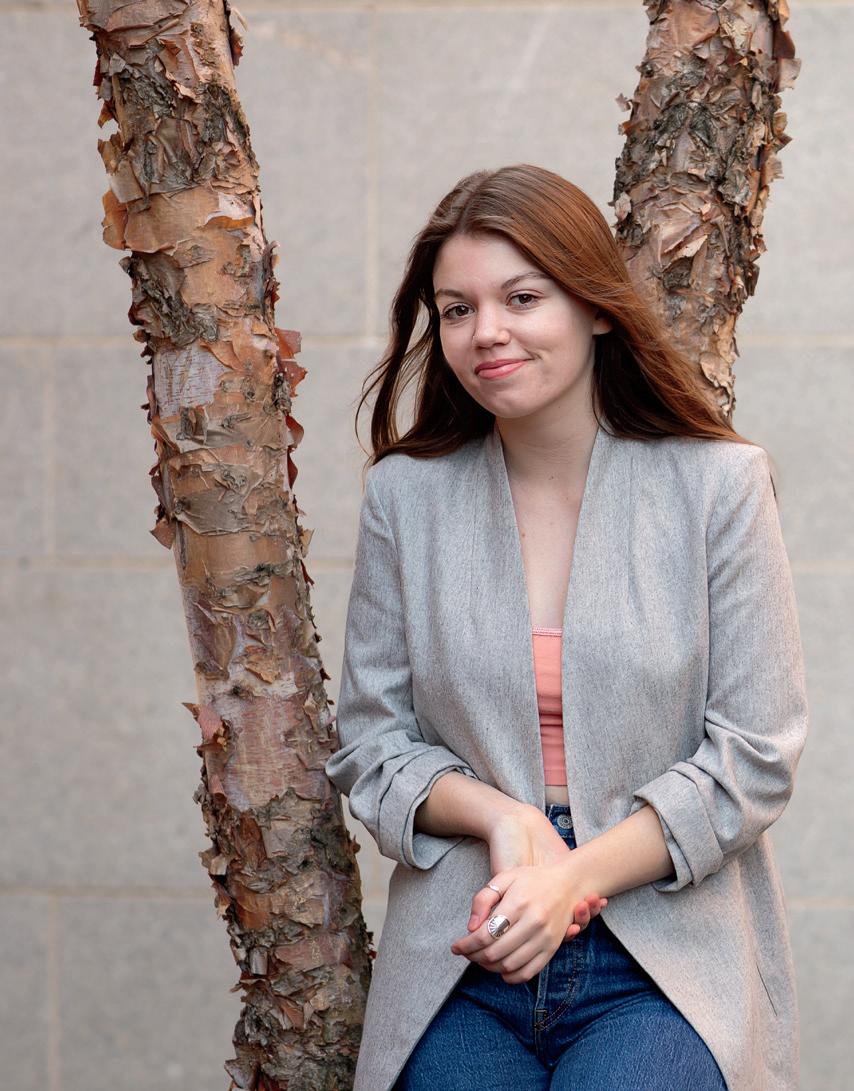
“I have met people here who will be in my life forever. I just feel really lucky.”
10
PHOTO BY KATHLEEN DOOHER
PAIGE DUFF ’24
AND SEXUALITY STUDIES MAJOR FROM ANN ARBOR, MI
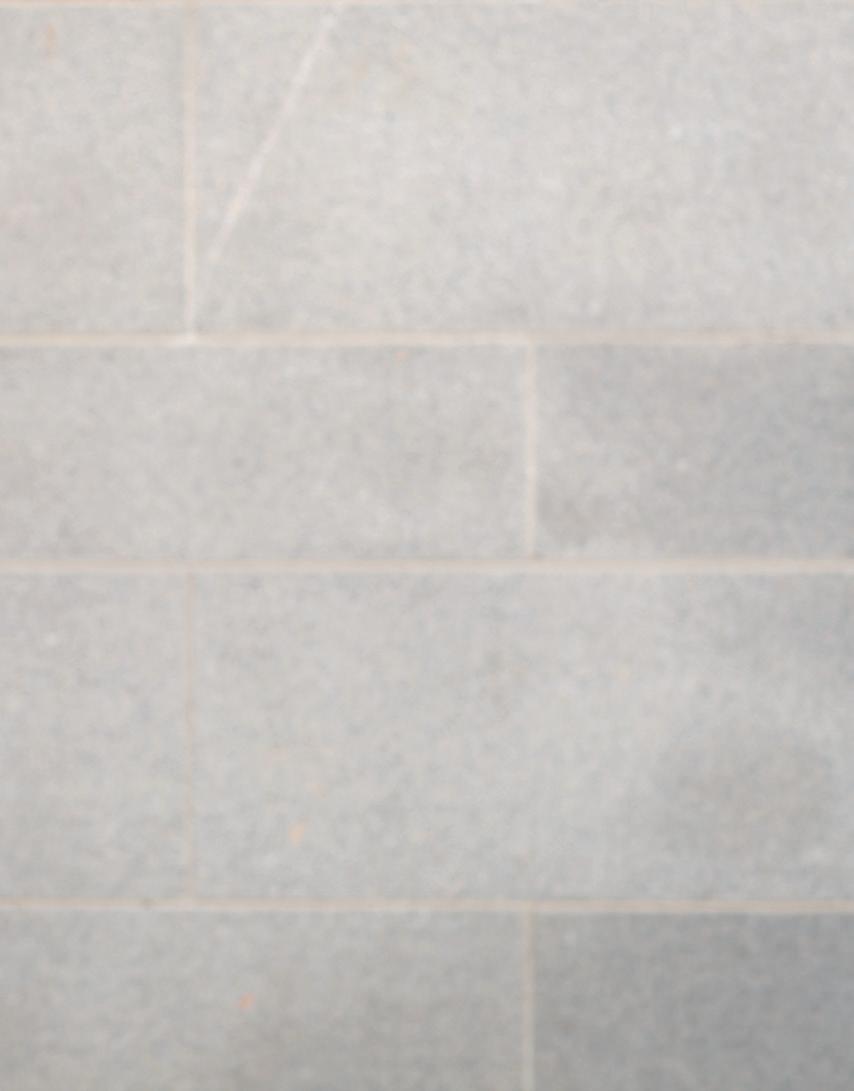
College is the perfect place to discover how your passions can make a greater impact. For Paige, an enthusiastic and driven senior hailing from Ann Arbor, Michigan, this was in the world of sexual and reproductive health advocacy. During her time at Tufts, Paige was inspired to work towards equity in attitudes towards women’s sexual health and expand access to accurate information for women about their own bodies.
Paige discovered her niche as a member of the Sex Health Reps (SHR), a program of student ambassadors focused on providing information about sexual health and safety to other students and aiming to eliminate sexual misconduct and reduce stigma surrounding these topics. Paige was interested in joining the program from the moment she arrived at Tufts, but at the time it did not accept first-year representatives. After demonstrating her enthusiasm for the leadership position, Paige became one of the first freshman reps in SHR history. “I’ve been involved in a lot of different ways and I’ve been lucky enough to hold different leadership roles, which taught me a lot about where I want to be,” she said. “I was able to realize that I love the forward-facing, very visible role.”
Some of the work with the program Paige is particularly proud of includes designing instructional cards for the envelopes in the Sex Health Vending Machine in the Campus Center, and her involvement with “Hump Day Q&A” a weekly series of videos in which Sex Health Reps answer anonymous questions from Tufts students. “I think [the program] is really unique to Tufts,” she said. “I don’t see structures like that often on other campuses and I think it is so special that we as students have
access to health information that is accurate but is also coming from our peers. It does a great job of democratizing health information.”
Being able to connect with her fellow Jumbos has been important to Paige during her four years on the hill. One particularly meaningful memory was when “we did a talk at the Women’s Center called ‘Cocoa and the Big O,’ which was a group discussion about the experience of being a girl on a college campus in terms of sexual health, sexual pleasure, and advocating for yourself. And we were just sitting on the floor, we all had these mugs, I think some of us were doodling, and it felt like such a community space. It was such a special night.”
In addition, Paige is a member of the mock trial team, which she credits as having helped her with personal growth and confidence in her advocacy work. Many of her favorite memories include time spent with her mock trial teammates, and she fondly reminisces about the close-knit community that the club offers. Paige believes that the community of Tufts is what she will remember most about her college years. “My favorite memories at Tufts have very little to do with things or events, and more just spending time with the people I have met here,” she said. “I have met people here who will be in my life forever. I just feel really lucky.”
As a women’s, gender, and sexuality studies major, Paige often gets questions about why she chose this field of study. In true mock trial fashion, she had a clearly articulated answer prepared: “Things like the Dobbs decision are reminders that your physical autonomy, your gender identity, your sexuality, are still so incredibly important. It’s the reason that reproductive justice spaces have been
able to evolve towards approaches of gender inclusivity. The expansions that we’ve seen in terms of abortion rights and abortion advocacy are largely due to the fact that there are still people who are really invested in exploring how these things can change. Feminism right now does not look like feminism in the 70’s, and it also doesn’t look like feminism in the 2000’s. That is because there are still places where people are investing in women’s, gender, and sexuality studies continually. I can say personally that those spaces at Tufts have allowed me to question things that I took for granted about womanhood, about the ‘woman’s experience,’ and about what I think being a woman is. Oftentimes, they have also allowed me to be self-critical and evaluate questions like, ‘where is this perspective coming from? Why do I have it?’ It is in these spaces that you’re able to have conversations with people that open you up to new perspectives.”
As for Paige’s post graduation plans? “TBD!” While she knows that her true passion is in sexual health advocacy, “what that looks like is up in the air right now, but I have had a lot of great internship experiences and connections with people all across the country”. Paige looks forward to the exciting new future ahead of her. I’m going back to Michigan with all my things and my parents and hugging my long-distance boyfriend and getting coffee at my favorite cafe in Ann Arbor and probably doing a Planned Parenthood clinic shift because I do those a lot when I am home. But as for the bigger picture, TBD!”
SHANNON MURPHY
’26
11
WOMEN’S, GENDER,
CHECK THESE OUT

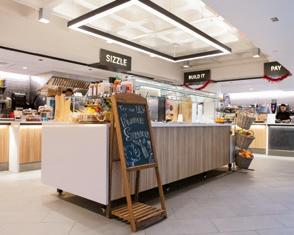

While every campus can boast about its dining halls or library, Tufts hosts a variety of unique spaces for students to tackle homework, make something new, or just relax with friends. If you are looking for a quick snack between class, or to flex some creative muscles, look no further. Here are some of the top spots you shouldn’t miss when you make it to campus.
BY RUBY MCELHONE YATES ’25


Crafts Center
Tucked under Lewis Hall, you will find music, chatting, and lots of crafts. The student-run Crafts Center is operated by volunteers who keep the space stocked and clean, helping Jumbos experiment with sewing, pottery, painting, printing, jewelry making, and anything else one might imagine.
The Sink
Good luck getting a table on the second floor of the Campus Center, where students line up for a Medford Fog (Earl Grey tea, vanilla, and steamed milk) or a Beesting (cinnamon latte with honey). The student-run coffee shop sports a variety of decorated coffee cups, is lined with international currency, and has warm pink lighting that makes it the perfect spot to hang out or do some readings for class. Bonus: bring your own mug and have it filled for the price of a small coffee!
The Digital Design Studio
On the third floor of Tisch Library, the Digital Design Studio has you covered if you need anything from a recording room for a podcast or 3D printers to make a model of your newest creation. The space is staffed by student experts and is meant to expand student access to visual design as well as audio and video production.
Nolop FAST Facility
The makerspace known as Nolop is open daily for students to build…just about anything. With woodworking tools, 3D printers, laser cutters, and more, students can make everything from laser-cut earrings to bridges that can hold hundreds of pounds. While most often frequented by engineers due to its location in the Science and Engineering Complex (SEC), Nolop is open to all students looking to build something new.
12
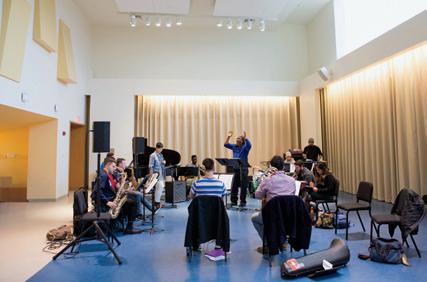


Tisch Roof
With its stunning view of the Boston skyline, the roof of the Tisch Library, accessible from the academic quad next to the Chapel, is a frequent spot for students to soak up the sun during the day, take in the stars at night, and of course, stop and smell the flowers.
Practice Rooms
On the bottom floor of Granoff Music Center, students sign out practice rooms to form a band, prepare for an upcoming concert, or just belt out their favorite song.
DSDI Centers
Sometimes unassuming wood frame houses across campus can hide some of the gems of Tufts: like the Division of Student Diversity and Inclusion (DSDI) Centers. The eight Centers across campus house a variety of resources for students, including a place
to hang out, study, and be with people who share your identity. Each of the Centers holds events and hosts clubs, like the Women’s Center Symposium, The Black Womyn’s Collective, and translation services for families in 35 Languages.
WMFO Studio
Tuft’s radio tradition can be traced back to 1956, and despite a number of setbacks (radiation leaks from equipment in the 60’s, a fire, and of course, the shutdown caused by the groups’ mischievous success in utilizing MBTA rails to serve as a ground antenna, expanding their broadcast all the way to Nashua, New Hampshire), WMFO is alive and well. Student and community DJ’s operate 24/7, playing everything from live music from student bands to electronic hyperpop. Additionally, the WMFO hosts a massive collection of vinyl records for students to peruse.
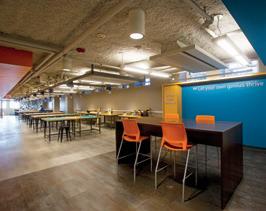

Fitness Center
The Steven Tisch Sports and Fitness Center houses an indoor pool, squash courts, a fitness center, and is attached to the Gantcher Family Field House where tennis courts for indoor play are surrounded by a running track. The perfect spot to work up a sweat or learn a new sport. Keep an eye out for the sauna as well!
Bacow Sailing Pavilion
While not technically on the Medford campus, just ten minutes away is the Bacow Sailing Pavilion, where students go to watch the sailing team practice and enjoy sitting out on the docks. Those around during the summer will often jump in for a quick dip, and some even go for a polar plunge during the chilly New England winters.
13 PHOTOGRAPHY BY ANNA MILLER/ALONSO NICHOLS/EMILY ZILM/TUFTS UNIVERSITY

WHY TUFTS? THE REWRITE
JED QUIAOIT ’25
CHEMICAL ENGINEERING AND BIOTECHNOLOGY DOUBLE MAJOR FROM SAN DIEGO, CA
Jed has been a stalwart member of the Tufts undergraduate admissions office for years. Whether writing for our many publications as a member of the Student Communications Group, giving tours to prospective students and their families, or supporting our staff as an Admissions Fellow, Jed is always there to lend a hand. When he’s not working in a lab or volunteering at a nearby hospital, you can find him hanging out with friends at Kindelvan Cafe in the Science and Engineering Complex.
WE ASK CURRENT STUDENTS TO TACKLE THE TUFTS SHORT-ANSWER QUESTIONS
Complete the following sentence in 100 words or less: “I am applying to Tufts because…”
I want to explore multiple facets of myself! Beyond my engineering journey, I get to try old and new things alike through clubs and jobs. You might see me doing research on post-translational modifications in proteins, learning my favorite Korean pop dances with the Korean Dance Association, tabling at the Campus Center as a Mental Health Rep, or playing badminton and tennis with my friends by President’s Lawn. At Tufts, the world is my oyster as Jumbos truly embrace the collaborative culture across campus, whether it be academics, extracurriculars, or hobbies you haven’t tried before.
TL;DR: Tufts is awesome when it comes to opportunities, self-exploration, and collaboration!
It’s cool to love learning. What excites your intellectual curiosity? (200–250 words)
During one of my late night study sessions at the library, I remember my best friend taking a glance at my computer before pointing his fingers accusingly at me for the nth time. Then, he dropped the million-dollar question:
“WHY. DO. YOU. HAVE. SO. MANY. OPEN. TABS?”
I saw his point. With tabs comes disorganization. It’s easier to get lost. Your browser slows down exponentially.
Here’s the amusing part: “too-many-tabs” syndrome (a.k.a. TMTS) isn’t limited to young adults. My biology teacher, my hospital supervisor, and my school librarian—all of whom are adults—are similarly afflicted by TMTS. So, what’s wrong with people like us? Plot twist: nothing!
Clutter and curiosity come hand in hand, especially for enthusiastic learners like myself. That tab-filled screen is my world, one that’s completely unique from anyone else’s, encapsulating ideas I find eye-catching and will indulge for hours and hours. Each tab represents my desire to know and discover something new after the next click. The psychology behind zodiac signs? Another tab. Tips to write concisely? Another tab. Ethics in pharmaceuticals? Another tab. Articles for beginners in web development? Another tab.
TMTS illuminates the fact that we are multifaceted and free-spirited individuals capable of exploring anything we want. Tabs promote, rather than deter, growth. The deeper we dig, the more we gain reassurance by familiarizing ourselves with ideas we weren’t previously aware of.
Now if you’ll excuse me, I’m opening up another tab to dive into a National Geographic documentary on mouse genetics.
15
PHOTO BY KATHLEEN DOOHER To see the 2024–25 Tufts short-answer questions, visit http://admissions.tufts.edu/apply/essay-questions
WHEN STUDENTS AND FACULTY FOR THE CLASSROOM COMBINE
At Tufts, your professors will be experts. Their research and writing push the boundaries of current pedagogy and expand thinking in their field. These professors are not only teaching upper-level seminars but often also teach introductory and lower-level classes to students still exploring their interests. Still, students and faculty alike may feel classroom dynamics need fine-tuning. To create the best student experience possible for Tufts undergrads, the Center for the Enhancement of Learning and Teaching at Tufts has developed the Pedagogical Partnership Program.
By Ruby McElhone Yates ’25

16
FORCES

17 ILLUSTRATION BY ROSIE BARKER
As a student walking into a classroom, there is a difference between how you might greet a professor and how you might greet a peer. Whether or not you believe this power imbalance is beneficial, it can make it difficult to raise issues with a professor about something in class that is bothering you. The Pedagogical Partnership Program’s mission is to help facilitate communication and allow for student perspectives to be heard by professors. The program has four goals:
The Pedagogical Partnership Program (P3) matches professors with current students to improve class time, review syllabi, and identify gaps in learning outcomes, all with an eye toward equity, inclusion, and learner-centered pedagogy. The student founders Jillian Impastato (A’21) and Langley Topper (A’21) found that students had a difficult time expressing themselves to faculty. To ease this power dynamic, student partners, (who are non-graded observers in the class focused on student engagement, instructor language, and effective communication) can bring student’s concerns to professors. Since 2020, over sixty faculty members have participated in the program, with classes spanning nearly every field and discipline.
The P3 program matches student partners based on availability, rather than area of study. In fact, students are specifically placed in classes where they are unlikely to have that professor later in their coursework to ensure fair treatment. Student partners host feedback sessions, allowing for anonymous student feedback to reach professors, a particularly helpful tool in classes covering contentious or sensitive topics. Faculty then meet with their assigned student weekly to discuss class dynamics and student experiences. These meetings help professors to develop their curriculum, elicit feedback from students in class, and brainstorm ways to make material more accessible and meaningful.
2 1
3
4
Provide students a space to contribute to learning and teaching at Tufts
Provide faculty members with a better understanding of student experiences
Provide faculty with additional forms of feedback on their teaching
Provide students and faculty an opportunity to collaborate on pedagogy

Student partners provide honest, specific feedback to their faculty counterparts, making a direct and lasting impact on their fellow students. Each section of a class has different needs and preferences, which is one reason why professors have partnered with the program multiple times. Change is slow but sustainable, and the semester-to-semester changes are done with flexibility to ensure the best student experience possible.
Alvalyn Dixon-Gardner ’24, a clinical psychology major, is a member of the P3 program in Professor Ryan Redmond’s education class Teaching and Learning in K–12 History and Social Studies
While Alvalyn does not plan on pursuing education as a career path at the moment, her partnership sparked a new interest in pedagogy. Alvalyn’s interest was partly due to the collaborative nature of P3, and in part because of the learning they experienced while sitting in on the class. “I was gaining double—gems were dropped from the class itself, and [from] being a partner.” Student partners are given inside access to what it means to work in academia, from the decisions made about what goes on the syllabus to the way the desks are arranged in the classroom. Alvalyn says, “As a student partner, you understand how much effort and energy professors put into their work, and also how it may or may not come across to students in the classroom.”
ILLUSTRATION BY ROSIE BARKER 18

Some students find this partnership is a way to learn both practical and abstract skills for their future as educators. Murilo Mascarenhas ’25 hopes to pursue a career in academia and pedagogy in the future. Already teaching art classes to students in their home country of Brazil, Murilo’s involvement with the P3 program has inspired them to think about their own teaching practices, including how to ask questions for reflection, provide feedback, and communicate effectively with various audiences. Murillo has not only served as a student partner, but also a leader of the P3 program, working as a student facilitator for peer meetings among partners as well as beginning to craft a curriculum for the program to ensure positive relationships and growth in partnerships in the future. This student leadership is indicative of the success of the program. Student decisions are highly valued by program administrators, and the leadership opportunities available to students reflect the program’s mission.
In addition to developing an interest in pedagogy as a field, Murilo found additional confidence through the P3 program. “I found that my strengths were highlighted in this work. I used to think I had to act a certain way to be professional and to engage people in a class. With the classes I taught, and with P3 even more, I see I have so many strengths I can highlight.”
Student participants come from many different backgrounds and are paid for the work they put into improving learning dynamics for their fellow students. The financial compensation provides students a chance to support themselves while also gaining an opportunity to be involved in the classroom. Heather Dwyer, Associate Director of Teaching, Learning, & Inclusion at Tufts who oversees P3, attributes a lot of the success of the program to these students. “The student partners are knowledgeable, thoughtful, and committed to improving teaching and learning at Tufts. Most student partners hold identities that are traditionally minoritized or marginalized in higher education, and they bring a lens of equity and inclusion to their partnerships.”
I was gaining double— gems were dropped from the class itself, and [from] being a partner.”
Professor Redmond has participated in the P3 program for four semesters. A Tufts alumnus and former middle and high school English teacher, he has been thinking about teaching practices for a long time. “It struck me as the kind of program I sought as a middle and high school teacher,” he said. Redmond sees the examination of teaching as a crucial professional process. As a Senior Lecturer in the Department of Education and the Director of the Middle and High School M.A.T. program, Professor Redmond has embraced the P3 model, appreciating its ability to create space to “slow down and pay attention.” He also says student partners bridge the gap between the class and professor. “As a faculty member, it allows me the space and venue to actually talk to a student and hear the questions, observations, the kinds of things that undergraduates at Tufts pay attention to. It helps me see what I am missing.” With different generational, social, and cultural expectations coming into a classroom, P3 is a great way for Tufts students to collaborate with faculty and create a learning environment that is beneficial for everyone.
19
‘‘
MEANT TO BE ’MATES
Entering Tufts comes with a plethora of new experiences. New classes, new scenery, new extracurriculars, and, most of all, a new roommate. For many incoming Jumbos, coming to Tufts is the first time they will share a room in the long-term with someone who isn’t family, and they might have some questions about the experience. Luckily, these four sets of roommates are proof that, no matter where you come from or what your previous experiences are, you’re likely to find a new friend. Here, current Jumbos discuss their favorite memories with their roommates to give you an idea of what first-year housing life is like at Tufts!
BY JAY GUO ’24
ELENA LOWINGER ’25
Chapel Hill, NC
EMILY ALARCON
’25
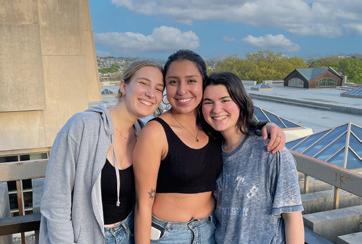
Chicago, IL
CAMILLE SMOKELIN ’25
Boxborough, MA
“Our favorite memory together freshman year was when Elena suggested we watch the Super Bowl together! None of us are big football fans, so for most of it we were half watching, half talking-andpretending-to-do-homework. We combined all of our desks to form a ‘megadesk’ to stream the game from and microwaved popcorn to watch from the beds. For Valentine’s Day, we’d decorated a bunch of paper hearts and taped them up onto string lights and just kept those on while we watched. I feel like that moment really encapsulates what our room was like: a warm, welcoming space where we would find any excuse to spend time together.”
20 LIVING
PHOTOGRAPHY COURTESY OF STUDENTS
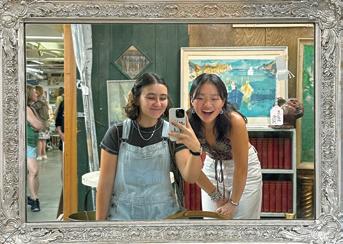
DAVID MARIN ’24
Tenerife, Canary Islands
BRYAN BERKOWITZ ’25
Los Angeles, CA
“For the first semester, we actually weren’t really close—not because we didn’t get along, but because Bryan sleeps at around 8pm and wakes up at 5am. Our schedules were so different that we didn’t talk much. It wasn’t until February that there was a morning I was lying in bed, no plans for the day, and Bryan asked if I wanted to join him for his run. We ended up running 3 miles down the Somerville community path—farther than I’d ever done before—passing all the art installations and talking the entire way. I never woke up at five again, but we definitely became good friends after that.”
ANTONIA RAMIREZ ’26
Bogotá, Colombia
MIA SHAO ’26
San Francisco, CA
“Last spring, we went bouldering in Cambridge for a couple hours. After climbing we got hungry and Mia suggested we go to a restaurant nearby. We were both excited because the place looked really good. As soon as we got there, we realized it was a fancy restaurant with a formal dress code and wine bottles all around. Both of us were covered in climbing chalk and completely underdressed. We doubted going for a second, but then we looked at each other and instantly knew that as long as we were together, it didn’t matter what other people thought. We ended up having a lovely meal, maybe the best we’ve had so far.”

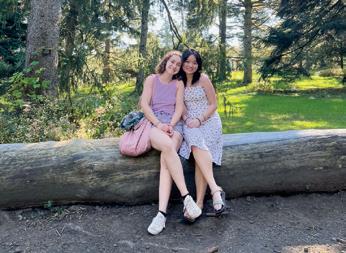
JULIA KLEIN ’24
Newtown, CT
WEIWEI CHAN ’24
Queens, NY
“Our favorite memory together was when we went to the Cheesecake Factory in Cambridge together with a small group of our friends. After eating way too much, we walked along the salt-and-pepper bridge until we decided we wanted something sweet. It was probably midnight or 1:00 a.m. at that point, so the only place still open was Insomnia Cookies. We walked all the way to Insomnia in downtown Boston and then ate on the steps of a church.”
21
KEIRA REDDY ’25
BIOLOGY MAJOR WITH A MINOR IN CHILD STUDY AND HUMAN DEVELOPMENT FROM PINE RIDGE, SD
Jumbos come to Tufts from all over the country and the world. But the transition to the Hill can be a huge shift in terms of culture or lifestyle, regardless of where you call home. Keira Reddy ’25, a biology major with a minor in child study and human development, hails from South Dakota. When she first arrived at Tufts, she found the bustle of city life a sudden shift from the rural environment of the plains where she was raised. “It was a very drastic change for me,” Keira said. “It was completely different from what I knew or [what I] grew up knowing.”
To help her with her transition, Keira participated in the summer program Bridge to Liberal Arts Success at Tufts (BLAST). This six-week residential program provides incoming students, who are often the first in their family to attend a four-year college or university, with the opportunity to take two courses for credit over the summer before they officially matriculate to Tufts participating in leadership and community-building workshops. Students in the program are also placed in an advising group that meets throughout the academic year. Keira said that BLAST was her biggest source of community, and that she made some of her closest friends at Tufts through the program.
Since then, Keira has been impressed by the diversity of the Tufts campus. She talked about how the variety of perspectives has allowed her to broaden her horizons and grow as a person.
“I was very amazed to see how different people from all different backgrounds come here,” she said. “Coming from a place where it’s only a population of Native Americans…and then coming
here where every language, every kind of culture is [represented]. Being exposed to that type of environment is what I needed, because back home I don’t have the ability to be where it’s so open and filled with opportunities. I feel that I can become the best version of myself here.”
Keira also finds a sense of belonging at the Indigenous Center, which holds events like beading workshops and ribbon skirt making that make her feel more connected to her life at home. “This is the kind of stuff that Native Americans do traditionally,” Keira said. “Especially in my high school, this is what we were doing all the time…so being able to do that at the Indigenous Center makes me feel more connected with everybody.” One endeavor she looks forward to with the Indigenous Center is being able to share food at the cooking events held there. Buffalos are very sacred to her tribe, and she enjoys having the chance to show her peers the importance of the buffalo through traditional dishes. “You’re able to share your knowledge about who you are and your own people, and then explore other people’s different tribes and their identity,” Keira said. “It’s an essential place to go and feel comfortable to open up.”
Keira is a biology major with a passion for plants. One of her favorite classes at Tufts has been Plants and Humanity which focuses on the development of plants globally, their multifaceted uses, and how biodiversity responds to ecological challenges. Her goal is to start her own botany business, which she is taking steps to achieve as a member of Women Entrepreneurs at Tufts (WE@T). She said that she found a close community in WE@T, which
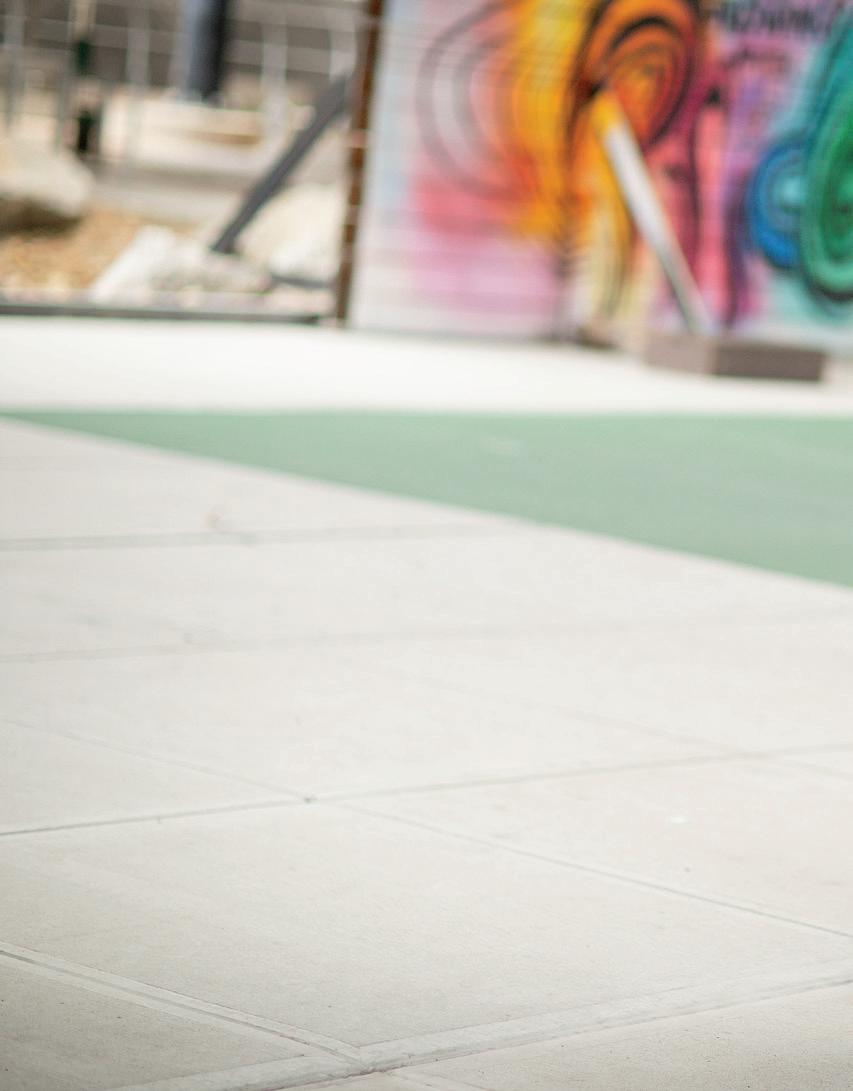
has served as a space for her to explore her own abilities as a business leader. She plans on doing research in different countries, learning how to extract medicine from plants and indigenizing this skill, and creating an entrepreneurial opportunity from her experiences.
Here at Tufts, Keira has forged her own space to continue exploring her interests. Currently, she is working on a garden for the Indigenous Center. With the unpredictable New England climate, Keira has struggled with finding an opportunity to engage in her favorite activity: cultivating plants. “Considering the weather and being in a dorm, plants are hard to grow here.” Keira said. “Having the opportunity to do what I love, I feel very excited about that. I want to help Tufts have a garden and see what it’s like to live sustainably.”
For students who struggle to find their community right away at Tufts, Keira says that you are not alone. “Putting yourself out there and stepping out of the box that you put yourself in helps you find that community.” she said. “I felt like I had to be this perfect person coming here. And I realized that that just wasn’t working. I wasn’t happy and I wasn’t finding the people I wanted to surround myself with. Finally stepping out of that box and trying to find out who I really was helped me attract like-minded people. And the professors here are so kind, welcoming, and supportive. Those aspects helped me realize that I could come in with my mistakes and didn’t have to be perfect. Tufts has really helped me become a better version of myself.”
SHANNON MURPHY ’26
22 JOURNEY TO THE HILL

“Tufts has really helped me become a better version of myself.”
23 PHOTO BY KATHLEEN DOOHER

MAJOR UPGRADE A CLASSIC MAJOR GETS A
The study of the ancient world is incredibly alluring—after all, it is the study of ancient societies that created the foundation for modern civilization. Since its inception, this field has largely focused on what many understand to be the “Classics,” or the study of ancient Rome and Greece. But recently, academics in this field have begun an earnest push to consider a wider range of ancient civilizations in their research—including at Tufts.
By Ruby McElhone Yates ’25
25 ILLUSTRATION BY © 2024 ANNA & ELENA BALBUSSO C/O THEISPOT.COM
ophomore Caroline Koon ’26 was checking over her courses for the Fall 2023 semester, when she realized her intended major, classical studies, was getting a rebrand. The Department of Classical Studies’s flagship major was becoming “ancient world studies,” an expansion of the previous major, “classical studies,” to include the ancient world outside of Europe from 3000 BCE to 800 CE. The new major joins archeology, Greek, Latin, and the combined Greek and Latin majors in the department.
Classics is widely revered at Tufts for being a small department with a major impact. The Perseus Project, run by Professor Gregory Cane, is an online library providing translations of ancient texts to English. This project allows students from around the world to compare the original text of foundational stories like The Odyssey, and glean some of what gets lost in translation using a side-by-side comparison. The project has earned grants from the National Endowment for the Humanities and highlights how language impacts meaning. Professor Cane not only runs this program but also teaches undergraduates in both classics and the Department of Computer Science. While classics and computer science may seem disconnected at first glance, the Classics faculty are excited to use new methods to connect their scholarship to other disciplines. One form of this expansion is through the new ancient world studies major.
Classics, the study of the Greco-Roman era and its societies, is a field that is dedicated to examining questions surrounding liberty, justice, equity, health, race, gender, and more that continue to impact the modern world. At Tufts, the department also offers courses in language, history, linguistics, archaeology, art history, economics, political science, sociology, and natural science. While already diverse in its offerings and subfields, the department has recognized a needed shift towards a more expansive study of the ancient world as a whole.

The shift is seen by some in the department as long overdue. Professor Bruce Hitchner, the department chair, shared with the Tufts Daily that, “one of the things we also wanted to do was to reframe [the] field, because so much of it was associated with European imperialism, colonialism, [and] white supremacy.” Caroline shared similar remarks, expressing how frequently the study of classics can be misused to explain and justify harmful rhetoric today. Tufts joins a handful of other universities that are at the vanguard of redirecting the focus of classics toward a wider study of antiquity, to better serve their current students and to pay respect to the wide variety of ancient cultures that have long been siloed or overlooked.
The new ancient world studies major requirements are as follows: two courses in ancient literature; two courses in ancient history; two courses in material culture or archeology; one course in ancient religion, mythology, or philosophy; one comparative course; and at least two additional courses in classics or a related department. The department hopes these new requirements will allow for students to take classes focused on other disciplines of the ancient world, like Near Eastern
26
“...ENGAGE THE ANCIENT WORLD
as a complex and evolving system within which no culture is studied as if it were the lone hero of human history but all are seen as participants and contributors to the fundamentally human project of trying to work out what are the best ways of solving our problems.”
Professor Matthew Harrington

Studies, Ancient Chinese Studies, and more, while still allowing for the study of Greco-Roman culture and history.
As a new major, the precise classes that will count towards it from other departments are still being evaluated. That said, affiliate faculty from the Departments of Political Science, Religion, Philosophy, and History have been added to the classics department experts, and courses about China, India, Egypt, North and West Africa, the Near East, and Northern Europe are all included in the scope of the ancient world.
Even before the shift to ancient world studies, the department had already been shifting towards a broader scope. One example is the course Greece, Rome, and China. Taught by Professor Matthew Harrington, who has taught multiple courses focused on the interconnectedness of the ancient world, this particular course aims to, “engage the ancient world as a complex and evolving system within which no culture is studied as if it were the lone hero of human history but all are seen as participants and contributors to the fundamentally human project of trying to work out what are the best ways of solving our problems.”
The study of antiquity can often be overlooked in favor of more recent historical and sociological events, but the field provides key context and guidance around behavior, government, and ethics of modern life. The Department of Classical Studies aims to deepen our understanding of the history of these ancient societies and teach Jumbos how the endurance and flaws of the institutions established long ago impact us to this day. With this more nuanced context, we are able to better understand what needs revising and what should be preserved.
Professor Hitchner stressed the importance of the study of the ancient world for those who will one day be making cultural and political decisions for the modern world. “If they don’t have any understanding of it, how can they make informed decisions?”
The name shift of the flagship major is also designed to expand the appeal of the major to students who are less interested in the Greco-Roman world, but who are still passionate about the ancient world in other areas. This will allow more people, including those outside of the new major, to connect their studies with the ancient world and develop a deeper understanding of the history, culture, and institutions that shaped today’s societies.
Additionally, Professor Harrington spoke about the personal importance of studying antiquity. “As I understand the process of intellectual growth, the encounter with the Other is vital for the evolution of the self, and the ancient peoples are profoundly Other, while being utterly human in their core desires and anxieties.”
With the new ancient world studies major, the information we take away about what works in society and what does not is no longer limited to the European world. Classics and related fields, like political theory or archeology, now have an expanded focus at Tufts to an even greater variety of societies and thinkers. This new focus on the world more broadly will allow students to consider how many different ancient societies functioned and thrived, and what was shared or distinct from their counterparts.
While Caroline’s primary focus will remain on the Greco-Roman world, she agrees that the change is past due. “With more and more information available, especially on cultures and societies we have overlooked or needed more technology to access, broadening the scope is really good for the field.”
27

FROM CLASSROOM TO CONVERSATION
PHOTO BY KATHLEEN DOOHER
To be a Jumbo is to be curious about the world around you. So much of our everyday life—from our literature to our architecture to our understanding of science—is shaped by the contributions of ancient cultures. Chris Petrik ’24 has found a particular interest in the language of the ancient Greeks and Romans. Professor Gregory Crane shares this passion—as both a professor of classical studies at Tufts and the Winnick Family Chair of Technology and Entrepreneurship, his research involves studying Greek and Latin and preserving them in the digital age. I had the opportunity to sit down with Chris and Professor Crane to talk about what it means to study classics and ancient world studies in our contemporary world.
BY SHANNON MURPHY ’26
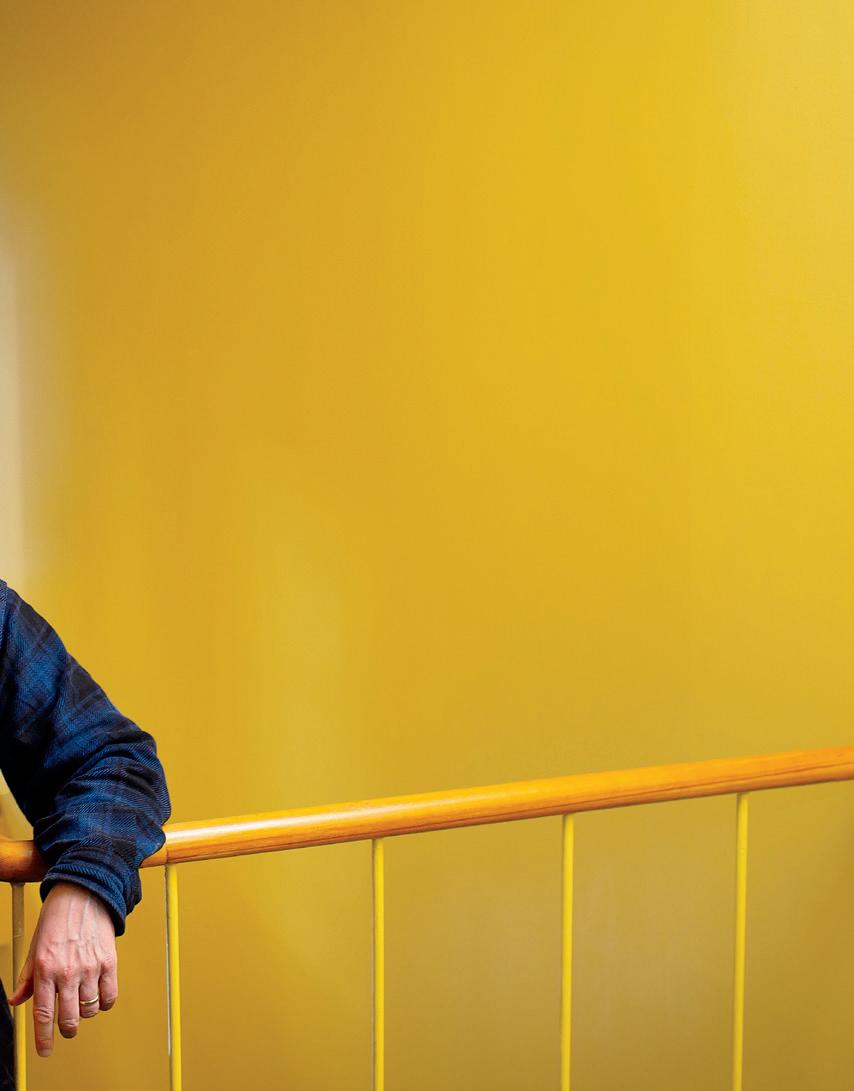
How did you two meet?
Chris Petrik: I went to a Catholic high school in Boston, they had a really good Greek program there and one of my teachers had a connection to Professor Crane. So she recommended that I email him and he let me sit in on his Marcus Aurelius class.
What drew you to the Greek and Latin major? What classes in the department have been your favorite?
CP: I pretty much knew that I wanted to study classics straight out of high school. I really enjoyed taking Greek and when I came here, I decided to also pick up Latin. I would recommend taking any of the epic courses—The Iliad, The Odyssey, and Virgil. I also really liked Professor Harrington’s class on Plutarch.
Gregory Crane: Professor Harrington has started to teach things that are really cool and normally don’t get taught, like Plutarch and Lucian. There’s a lot going on right now in the Greek program.
The Department of Classical Studies renamed its flagship major from classics to ancient world studies. Could you talk more about this change?
GC: The idea was to begin to nominally go beyond Greek and Latin. Classics also has other kinds of associations about a certain canon of material. I’m probably going to propose a rotating class for other ancient languages. So things like Akkadian, which is one of the cuneiform languages of the Near East, or Coptic, which is a later form of Egyptian, so that people can have exposure to a wider range of things. Those things are more feasible now because of all the computational tools available to work with the language.
Professor Crane, I noticed you are also the founder of the Perseus project. What exactly is that?
GC: The Perseus project is an ongoing experiment with what happens to the way we work with the human record when everything goes online. I don’t think of myself as a classicist, the term I would use is philologist, and philology means the love of language as a discipline. It basically means the lived understanding of the past in its entirety. And when you conceive of it that way, it’s really open ended in terms of the methodology you use. So natural language learning and machine processing is important. But it also answers the challenge of AI: however smart it may become, it doesn’t involve what happens in the human head. So the buzzword
I go for is the other AI, or augmented intelligence (artificial intelligence working together with human intelligence rather than replacing it). We work on augmented intelligence in the understanding of the past and in disseminating that understanding as broadly as possible.
Chris, what are your plans for after graduation?
CP: As of right now, I’m looking at paralegal jobs. I’m looking to get a job somewhere in the legal field for a few years and hopefully law school afterwards. And how do you think your classics education at Tufts prepared you for that path?
CP: It’s a lot of reading and writing, and reading other people’s writing. And I think that working with secondary sources, having these deep reading skills, and being able to understand a lot of information has really helped me get into this specific mindset of reading a sort of separate language like I would in the field of law.
Why is studying the classics and ancient world languages relevant today?
CP: If you look at any story… all the stories are really the same, right? Every story is going to be an augmented version of a previous story. For example, when in The Odyssey we’re talking about the Laestrygonians and the Cyclopes, it’s really the same story just with a slightly different mix. Then you get to Virgil’s Aeneid, and that’s pretty much just a retelling of The Odyssey, and then you get to the back half of the book and you get into The Iliad. You can see how these stories develop and how they transcend and wedge themselves more deeply into society.
GC: I think that there is a bias in the way we look at the world, and there’s a lot of actual commercial or capitalist incentives to say “Forget about the past, let’s buy the new! Keep churning!” But the deep cultural patterns that shape us have been formed over hundreds and thousands of years. And if you really want to understand the geological substrate of various aspects of European or Asian cultures, you really want to look at their deep history and be able to relate their past to their present. In other words, these stories are part of you. They’re part of your formation.
29
ELEGANCE, FLAIR, AND COMMUNITY DANCE GROUPS AT TUFTS
Besides the dance minor and the brand new dance major, over twenty student dance groups can be found twirling, leaping, and stomping across campus. Dance performances regularly sell out of tickets to the public (but they are free to students) within hours, even minutes, of their release. While the Department of Theatre, Dance, and Performance Studies hosts classes ranging from Ballet I to Tai Chi to Dance and The Hollywood Musical, the wide range of student groups are not to be underestimated.
BY RUBY MCELHONE YATES ’25

For those looking to compete:
Tufts hosts a wide variety of competitive dance teams, with styles ranging from Banghra to Ballroom. Teams practice regularly and compete in the Boston area and across the country. Each year, multiple Tufts dance teams compete at Break the Stage, a step competition hosted by Tufts’ Black Student Union.
For those who just want to have fun:
Check out open lessons and learn from the best! Groups like Encendido, Sarabande, and Spirit of the Creative host open classes run by their members so other students can learn the style and moves of the group. Tufts Dance Collective is a dance group for those with two left feet. The non-audition group focuses on learning to dance and having fun together, rather than perfect form and rhythm. Designed to be a non-competitive, unintimidating, environment, Tufts Dance Collective is an enjoyable way to get moving in a judgment-free environment.
For those looking to explore identity and culture:
Dance teams at Tufts are a popular way to connect with one’s heritage, or honor and learn about new cultures. Tufts hosts several dance teams that celebrate identity and diaspora including COCOA Dancers, Encendido, Harlem Grooves, R.O.T.I. and R.U.M, Korean Dance Association, Tufts Wuzee, and the four South Asian Dance teams: Tufts Bhangra, JumboRaas, Tufts Pulse, and Tamasha. These groups allow students to connect with music from around the world and showcase a diversity of dance styles and cultures.
Not sure where to start?
Talk to one of our Student Dance Ambassadors! These students are invested in dance at Tufts, whether it be through the major, classes, or clubs, and want to help others get involved. Check out their bios on the Tufts Dance website.
PHOTO BY JENNA SCHAD/TUFTS UNIVERSITY ARTS HIGHLIGHT
AROUND TOWN
CRAVING COFFEE
From pre-class energizers to late-night study fuel, coffee is ubiquitous in the hands of college students. With half a dozen options right on campus and twice as many nearby, Tufts is certainly no exception—the only challenge is choosing where to grab your cup! You’ll read about the popular on-campus coffee spot, The Sink, in the Check These Out article on page 12 of this issue, but there’s a variety of others to explore. Coffee-lovers at Tufts, this article is for you: here’s a guide to some of the best spots on and around campus to get your fix. BY
JAY GUO ’24
KINDLEVAN CAFE
on campus
Renowned among Tufts students for their elaborate smoothie concoctions, Kindlevan’s coffee offerings are often overlooked. Located right on Tufts campus under the gorgeous skylight atrium of the Science and Engineering Complex, Kindlevan is a convenient spot for a sweet snack, lunchtime panini, or caffeinated midday pick-me-up! Even better, they accept meal swipes, so meal plan users can grab and go with the convenience of their Tufts card. Once you’ve ordered your drink, sit on the ground floor by the Hendricks Art Wall or move upstairs to enjoy the sunny, spacious, four-floor view!
Try their caramel macchiato!
DIESEL
off campus
Don’t be fooled by its inconspicuous exterior: sporting a cacophony of exposed pipes, red brick, and repurposed street signs, Diesel’s ambiance is as eccentrically industrial as its name. Whether you come for the impressive decor (an entire motorcycle adorns the back wall—seriously) or the busy, clanging atmosphere, this coffee shop just down the street in Davis Square is a study space like no
other. Walk past the counter and you can even find an ice cream bar and additional booth seating— you’ll only have to pass curtains of hanging plants and (functional) streetlights to get there!
Try their Vietnamese iced coffee!
TAMPER
off campus
There’s no better way to describe Tamper than “classic.” With polished oak tabletops, free Wi-Fi, and a coffee-inspired name to boot, Tamper supplies the true college café experience. Its wall-sized windows (facing directly onto Boston Ave!) fill the interior with a plethora of natural light, and the proximity to campus has branded Tamper a hotspot for study sessions and hangouts across Tufts. Be warned, though—their roast is very dark, so if you don’t like it bitter, I’d recommend honey or sugar in your drink!
Try their iced latte with honey!
TASTY
off campus
Sleek, elegant, modern. Clad in minimalist marble and black porcelain tile, Tasty is an upscale option for brunch and coffee-lovers alike. Despite their
lavish vibe and luxurious menu items (Norwegian smoked salmon??), Tasty has an intimate and inviting energy—perfect for meetings and lunch dates. To top it all off, Tasty’s beans are sourced from Atomic Coffee, a local roastery based in Peabody, Massachusetts. For coffee aficionados, that means freshly roasted beans you can try and buy right in-store!
Try their cappuccino!
CICADA
off campus
This coffee shop is for more adventurous Jumbos who are open to a walk to get their caffeine fix. The bricks crawl with vines. The door is small and sunken into the storefront. This low-key venue, simultaneously a coffee bar and Vietnamese restaurant, lies on Prospect Street in Cambridge. During its daytime hours (8AM–3PM) you can grab a cup of coffee and traditional Vietnamese lunch fare—think spring rolls and bánh mì—but evening hours (5PM–11PM) drench the interior with soft, neon-red light and the hearty smell of pho. If you want great food, coffee, and a hidden gem to introduce to all your friends, come to Cicada!
Try their sea salt iced coffee!
31
SOHA HASSOUN
PROFESSOR OF COMPUTER SCIENCE, ELECTRICAL & COMPUTER ENGINEERING, AND CHEMICAL & BIOLOGICAL ENGINEERING
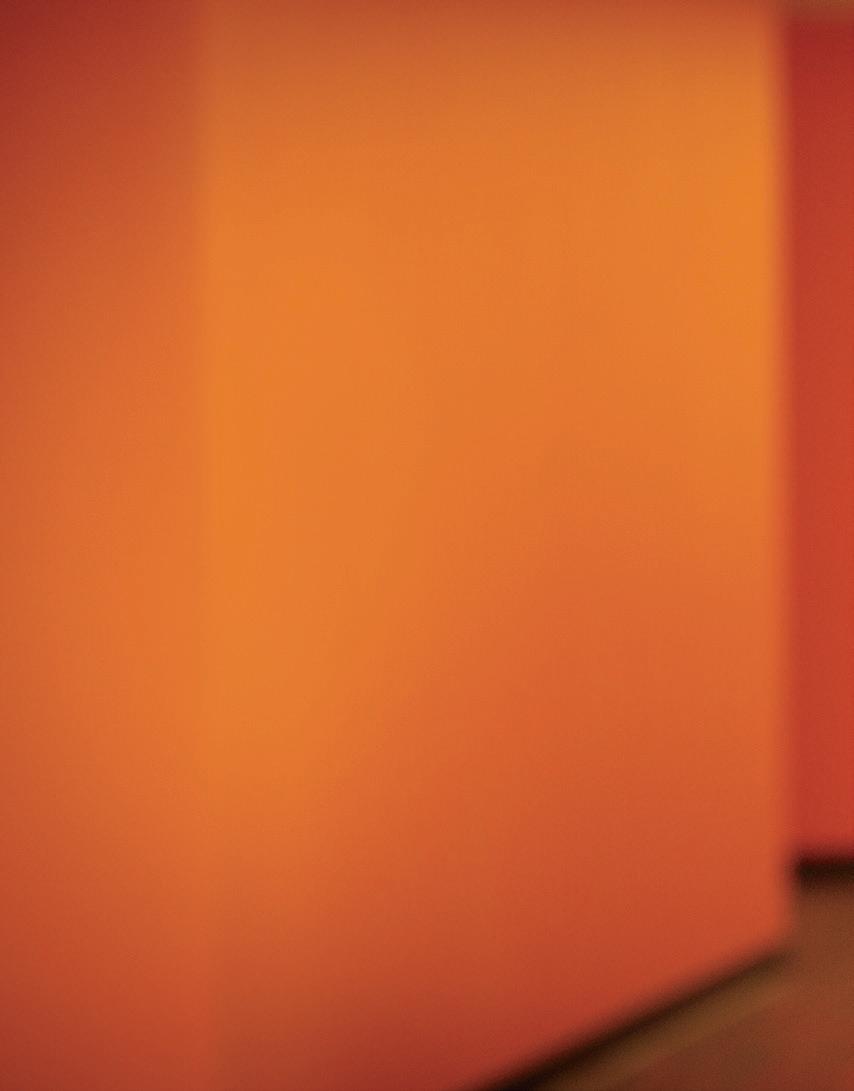
Typically, Jumbos officially take their first steps as students into Tufts on a hot September day. Meanwhile, Professor Soha Hassoun first visited the hilly campus right after a huge snowstorm. “I was really impressed with the vibe on campus, and the students’ energy is what has really kept me at Tufts all these years. Interacting with students and picking their brain about what they learned in class or in my research group really motivates me to keep giving to the school and to the students.” With appointments across the departments of Computer Science, Chemical & Biological Engineering, and Electrical & Computer Engineering, Professor Hassoun is deeply involved in engineering life at Tufts.
In the fall, she teaches an introductory engineering course called The Craft of Computer Science Research, where students dabble in topics ranging from machine learning to quantum computing to computational geometry. Students develop a research proposal by the end of the semester based on group work and self-guided literature review. “The whole idea is to expose students to research. What does research mean? What is the process of research, what skills do you need to do research?” says Hassoun. “From a professor’s
point of view, it’s very exciting to invent and offer new classes to interact with students, especially when the class serves a particular population.”
Hassoun also leads a research lab specializing in the intersection of machine learning and systems biology. Her lab’s mission is to develop tools to provide insight into complex biological systems, making use of machine learning models customtailored for biological data. As its principal investigator, Hassoun picks projects that are computationally interesting that no one has tried to tackle before.
“Within my group, students work on projects related to a particular topic with collaborators—synthetic biologists, chemists, dental professionals, so on and so forth—because I do believe that what I need to be building is something that somebody’s going to actually use and benefit from.”
In both teaching and research experiences, Hassoun values mentorship. “In research, you don’t just start doing it from scratch; you have to build the background and the knowledge! So, the whole time I’m doing research, I’m thinking in the back of my mind: what kind of training do I offer these students? How do I help these students become better researchers or engineers or computer scientists?” After all, students come from a
range of backgrounds. Professor Hassoun started as an electrical engineering undergraduate before integrating computer science to her Masters and PhD programs. After collaborating with Kyongbum Lee, Dean of the School of Engineering, she found herself fascinated by the prospect of thinking about problems outside designing circuits and developing software. “Think about the human body and how little we really understand about what mechanistically happens in there, and then what happens to the human body as a system. Now, what if we can use computer science to advance this biological discovery? That’s how I got hooked on the biocomputing side of science.”
You might wonder, what gets Hassoun going? With the rise of deep learning, neural networks, and large language models (think ChatGPT) in an increasingly technocentric world, she is definitely eager to see what’s next in computer science. She exclaims, “disruptive technology is happening right in front of us! It’s incredibly exciting to harness this level of computational power and be agile in terms of capitalizing and using it in meaningful applications.”
JED QUIAOIT ’25
32
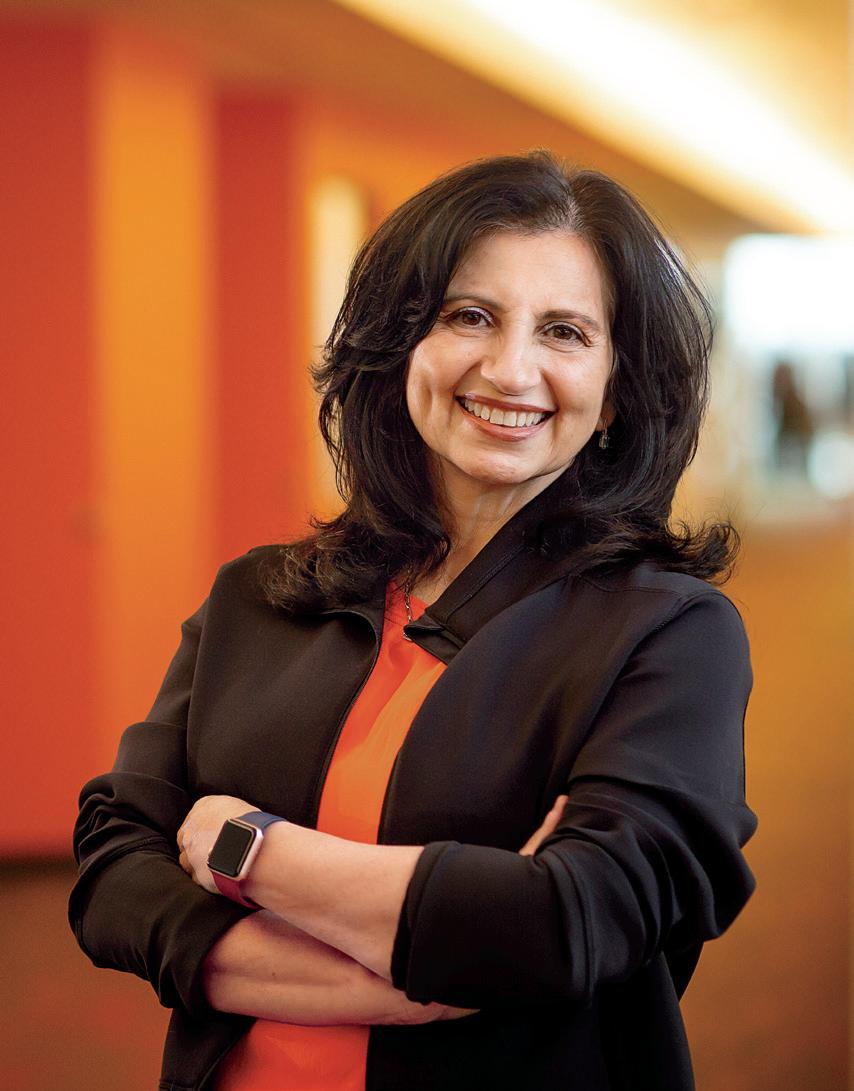
“The students’ energy is what has really kept me at Tufts all these years.”
33 PHOTO BY KATHLEEN DOOHER
JUMBOS BALANCING THE CLASSROOM AND THE FIELD
At Tufts, anyone can be (and do) anything! One often unexpected combination that is actually quite common is the engineering athlete. From lacrosse to volleyball to field hockey to cross country, these students add representing Tufts on the field on top of their handson engineering curriculum. One might wonder: what is the studentathlete experience like, and how do these students balance their engineering coursework and the expectations of Division III varsity athletics? We asked a handful of these hardworking Jumbos to find out.
BY JED QUIAOIT ’25

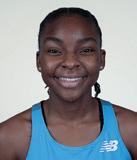

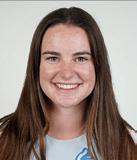
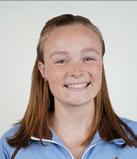


34 ATHLETICS
Kalembwe Chomba ’25
Emma Claus ’25
Jevon Coney ’26
Claire Gavin ’25
Celia Bryne ’24
Patrick Solomon ’25
Kalembwe Chomba ’25
Women’s Track & Field / Chemical Engineering
“Being a student-athlete is a dream come true for me. However, it’s like an intricate dance of managing my time, staying physically fit, and maintaining mental fortitude. To navigate the demanding workload of my engineering studies and the rigors of varsity sports, I had to restructure my perspective: I now envision track and field as the activity I engage in in my downtime within the same 24 hours we all have.
Think of it this way: we all have 24 hours in a day and at some point, we do something that we enjoy with the free time we have. Whether watching TV, attending campus club meetings, or sleeping, everyone finds a way to ‘escape’ school whenever their schedule permits it. For me, that’s track and field. Running not only helps me relax after tackling complex science concepts in class but also gives me a refreshing break amid my social and academic commitments. The key is prioritizing what needs to be done.
On more demanding days, I’m thankful for my supportive coach and teammates who allow me to focus on what’s most important. Overall, being part of the varsity track and field team isn’t just about sports; it provides a sense of community, the chance to travel for competitions and explore other parts of New England, and invaluable lifelong connections. It’s a unique blend that adds excitement and a sense of belonging to my university journey.”
Jevon Coney ’26
Men’s Football / Mechanical Engineering
“Being a student-athlete in the School of Engineering at Tufts is a rigorous yet rewarding journey. It demands organization, focus, and discipline on and off the field. The workload is substantial, especially during the sports season, but with judicious use of time and determination, it’s achievable. This experience shapes us into well-rounded individuals, capable of handling diverse responsibilities with grit and perseverance. Roll Bo’s!”
Celia Bryne ’24
Women’s Sailing / Biomedical Engineering
“Beginning with freshman year during COVID, sailing was a great escape from the bounds of my dorm room which I otherwise did not often leave. I found that the team provided an amazing support system for me, and there were plenty of teammates who understood the engineering workload and were able to help me whenever I had questions about my homework. My experience at Tufts has largely been shaped by this team and the many hours spent together on the water.
Overall, studying biomedical engineering and playing a two-season sport has helped me become skilled at time-management. This is my second year as captain of the sailing team, and this leadership role came with a greater commitment to the team. As nervous as I was to take on this role, I found it an incredibly rewarding experience. The biggest takeaway I have from a time management perspective is that collaboration will provide a faster path to success. Connecting with people in all of my classes and forming study groups allowed me to be efficient in my studying, as well as forming some great friendships.”

Emma Claus ’25
Women’s Swim & Dive / Electrical Engineering
“I find that time management is imperative in being a successful engineering student in addition to being a varsity swimmer. I also have an amazing class of electrical engineers that all work collaboratively so that everyone can do their best! The schedule can be a bit hectic, but I love every second of it!”
Claire Gavin ’25
Women’s Field Hockey / Mechanical Engineering
“For me, the student-athlete experience has been extremely rewarding to be able to participate in a collegiate sport and classes that interest me. I get to challenge myself during the season with an amazing team, and then learn from professors that really care about their students. Like anything, I have to budget my time really well. However, having the commitment of a sport makes the workload all the more rewarding.”
Patrick Solomon ’25
Men’s Baseball / Biomedical Engineering
“I have enjoyed every moment as a student-athlete in the School of Engineering. While it is challenging, it is extremely rewarding and has been beneficial in all parts of my life. I had to learn to balance academics with athletics which required time management and prioritization, but the expectations associated with varsity athletics have always been covered by my love for baseball, and I wouldn’t trade it for anything.”
SCHAD/TUFTS UNIVERSIY
PHOTO
BY JENNA
EXPANDING YOUR INTELLECTUAL HORIZONS

If you are someone who likes to ask why, philosophy is the department for you! Jumbos are known for their intellectual curiosity, and in a philosophy class on the Hill, you’ll be fully engaged in discussions that are sure to make you think outside the box. BY
SHANNON MURPHY
’26
PHIL 91-08: The Meaning of Life
What is the meaning of life? Does life even have meaning? Why do we exist? This course explores the angles through which we as humans contemplate our own existence and attempts to answer one of the most debated questions throughout history. Students work to define meaning objectively in relation to life itself, but also subjectively in determining whether or not one is living a “meaningful life.” You will adopt a mindset to look outside yourself at forces within and beyond our control and try to explain “what does it all mean?”
PHIL 120: Metaphysics
Mind vs. matter, mental vs. physical, potential vs. actual. Metaphysics seeks to understand the fundamental nature of what is real: what makes objects distinct from one another, and how we know these objects even exist? Focusing on identity, this class seeks to understand how we know something or someone remains the same, even as it changes, and what those properties are that keep them the same. We’ve all asked ourselves why something is the way that it is, and this class will give you a concrete answer for the next time that question crosses your mind.
PHIL 123: Philosophy of Law
Through the lens of ethics, students examine “the relationship, or lack thereof, between law and justice.” Discussions include the legitimacy of the law, justifications and excuses for crimes, and the reasons why certain acts are criminalized and how they are punished. You will look at court cases in American history and learn the rationale behind the decision that was made. If you have an interest in criminal law, this class is the perfect place to explore it!
PHIL 52: Aesthetics
Beauty is in the eye of the beholder, but have you ever wondered why that is? What causes people to value some works of art more highly than others? This course seeks to determine the value of art—psychologically, metaphysically, emotionally, aesthetically, culturally, and politically. What makes art so significant in our lives, and what have philosophers throughout history offered as explanation for this significance? Students taking this class will explore different forms of art, including music, dance, drama, and visual art, and learn how to determine their meaning and assess their importance.
CLASS HIGHLIGHTS 36

ILLUSTRATION BY © 2024 KEITH NEGLEY C/O THEISPOT.COM
ADMISSIONS INFORMATION
WHAT TO SUBMIT: HERE’S THE LIST. FIND MORE DETAILS ON OUR WEBSITE!
4 1 2 3 5 6 7 8 +
Common Application, Coalition Application, or QuestBridge Application
Tufts Short-Answer Questions
High School Transcript(s)
Senior Year Grades
Testing (Optional)
We accept either the ACT or the SAT; neither is required. Applicants may choose whether they wish to have exam scores considered as one component of their application.
Letters of Recommendation
We require one from a school counselor and one from a teacher in a junior or senior year major academic course (math, natural science, social science, English, or a world language). You may send us one additional if you’d like.
Art Portfolio
Required only for applicants to the BFA and Combined Degree (BFA + BA/BS) programs.
Financial Aid Documents for US Citizens
If you are applying for aid, you will need to submit: 1. FAFSA 2. CSS Profile 3. Federal Income Tax Returns
For more information, or for foreign nationals, please visit students.tufts.edu/financial-services-home.
Additional Materials (Optional)
• Alumni Interview
• Arts or Maker Portfolio: Students applying to the School of Arts and Sciences or the School of Engineering may submit an optional arts or maker portfolio to highlight talent in studio art, drama, dance, music, or engineering.
APPLICATION DEADLINES AND NOTIFICATION DATES*
Early Decision I
Application Deadline: Early November
Notification Date: Mid-December
Early Decision II
Application Deadline: Early January
Notification Date: Early February
Regular Decision
Application Deadline: Early January
Notification Date: By April 1
Transfer Admission
Application Deadline: Mid-March
Notification Date: Mid-May
*Please visit admissions.tufts.edu/apply for the most up-to-date information on deadlines.
TUFTS
CLASS OF 2028 ADMISSIONS PROCESS
34,000+ first-year applications
10% admitted
100% of demonstrated financial need met for all admitted students
In the first four years of our SAT/ACT test-optional pilot, around 50% of applicants and around 60% of admitted students submitted scores. Please review our website for the latest information about our testing policies.
Please visit our Class of 2028 Profile, available online in September, for more information.
TUFTS UNDERGRADUATE STATISTICS
6,815 Undergraduate Enrollment
4.8 Miles from Boston
20 Average Class Size
28 Varsity Sports Teams
350+ Student Groups
46% Women in the School of Engineering
45% of Juniors Study Abroad
$55,697 Average Grant Award
88 Countries Represented
2024
As of Spring
38
THE REAL DEAL: FINANCIAL AID AT TUFTS
THE BASICS
WHAT IS FINANCIAL NEED?
Cost of Attendance
Tuition and fees
Food and housing
Books and supplies
Personal expenses
Expected Family Contribution
Parent contribution Student contribution
Financial Need
Your award may include: Grant aid*
Student loan Work study
Your Expected Family Contribution (EFC) is the amount your family is expected to pay for college for the academic year. It is calculated from the information provided on your Free Application for Federal Student Aid (FAFSA), CSS Profile, and your family’s federal tax returns. Your financial need is the difference between the annual cost of attendance and your calculated family contribution. Your financial aid package will make up the difference, for all four years—even if your family’s situation changes. We generally do not include student loans for students whose families earn less than $60,000 per year. All Tufts financial aid is need-based—we do not offer merit-based scholarships or athletic scholarships.
*Grants are need-based gift aid that are not paid back.
HOW DO I APPLY?
COMPLETE THE REQUIRED DOCUMENTS:
Free Application for Federal Student Aid (FAFSA)* fafsa.ed.gov
Tufts code: 002219
Cost: free
*Note: not required of international or undocumented applicants for financial aid
BY THE DEADLINE*:
College Scholarship Service (CSS) Profile cssprofile.collegeboard.org
Tufts code: 3901
Cost: $25 initial fee plus $16 for each additional college. Fee waivers are available for students who qualify for an SAT fee waiver or whose family incomes are below $45,000.
Non-Custodial Profile (NCP): if your parents are divorced or separated. The requirement may be waived by the Tufts Financial Aid Office under very specific circumstances.
Federal Income Tax Returns
Applicants should submit all documentation to IDOC (idoc.collegeboard.org/idoc), an electronic imaging service of the College Board. Your account will be created at idoc.collegeboard.org once you submit the CSS Profile. Please do not send tax returns directly to Tufts Admissions or Financial Aid.
If you are applying for financial aid at Tufts and have a Social Security number, please make sure to include that information in your application for admission so your materials can be properly matched.
*Please visit admissions.tufts.edu/tuition-and-aid/applying-for-aid/ for the most up-to-date information on deadlines.
To estimate the amount of financial aid you might receive if admitted to Tufts:
MyinTuition admissions.tufts.edu/ myintuition
Tufts Net Price Calculator npc.collegeboard.org/ student/app/tufts
For questions while applying:
CSS Profile 305-420-3670
With Us” Service
39
WHO CAN HELP? Application Type Early Decision Round I Early Decision Round II Regular Decision Transfer Admission CSS Profile Mid-November Mid-January Early February Early April FAFSA Mid-November Mid-January Early February Early April Federal Tax Forms Through IDOC Early December Early February Mid-February Mid-April
( ) ( ) ( ) PLEASE REVIEW THE FINANCIAL AID WEBSITE FOR THE MOST UP-TO-DATE INFORMATION AND DEADLINES: ADMISSIONS.TUFTS.EDU/TUITION-AND-AID
TUFTS MEETS 100% OF DEMONSTRATED NEED FOR ALL ADMITTED STUDENTS, REGARDLESS OF CITIZENSHIP STATUS, FOR ALL FOUR YEARS.
FAFSA 800-433-3243
IDOC
212-299-0096
“Chat
866-897-9881 (US and Canada)
(International)
PROGRAMS
With nearly 150 majors and minors, 30 interdisciplinary programs, and the courses of the Experimental College, Tufts’ offerings require more than a brief skimming, so you can find an expansion of this quick list on our website. But in the meantime, skim away. Just note that Tufts’ undergraduate programs are offered in three schools: Arts and Sciences, Engineering, and the School of the Museum of Fine Arts. Students may take classes across schools, and many students do.
SCHOOL OF ARTS AND SCIENCES MAJORS
Africana Studies
American Studies
Ancient World Studies
Anthropology
Applied Environmental Studies
Applied Mathematics
Applied Physics
Arabic
Archaeology
Architectural Studies
Astrophysics
Biochemistry
Biology
Biomedical Sciences1
Biopsychology
Biotechnology1
Chemical Physics
Chemistry
Child Study and Human Development
Chinese
Civic Studies1
Clinical Psychology
Cognitive and Brain Science
Community Health
Computer Science
Economics
Education1
Engineering Psychology
English
Environmental Geology
Environmental Studies1
Film and Media Studies
French
Geological Sciences
German Language and
Cultural Studies
German Studies
Greek
Greek and Latin
History
History of Art and Architecture
Interdisciplinary Studies
International Literary and Visual Studies
International Relations
Italian Studies
Japanese
Judaic Studies
Latin
Latin American Studies
Mathematics
Middle Eastern Studies
Music, Sound, and Culture
Philosophy
Physics
Political Science
Psychology
Quantitative Economics
Race, Colonialism, and Diaspora Studies
Religion
Russian and Eastern European Studies
Russian Language and Cultural Studies
Science, Technology, and Society1
Sociology
Spanish Cultural Studies
Spanish Literature
Theatre, Dance, and Performance Studies
Women’s, Gender, and Sexuality Studies
SCHOOL OF ENGINEERING MAJORS
Architectural Studies
Biomedical Engineering
Biotechnology1
Chemical Engineering
Civil Engineering
Computer Engineering
Computer Science
Data Science
Electrical Engineering
Engineering
Engineering Physics
Engineering Science
Environmental Engineering
Environmental Health
Human Factors Engineering
Mechanical Engineering
SMFA AT TUFTS AREAS OF STUDY
All BFA students at SMFA at Tufts focus in interdisciplinary art. They may explore many of the following areas of study while pursuing this interdisciplinary art education.
Animation
Book Arts
Ceramics
Digital Media
Drawing
Fibers
Film
Graphic Arts
Illustration
Installation
Jewelry
Metals
Painting
Papermaking
Performance
Photography
Printmaking
Sculpture
Sound
Video
Virtual Reality
FIVE-YEAR COMBINED
DEGREE PROGRAMS
Arts & Sciences/SMFA
Combined Degree: BA or BS and Bachelor of Fine Arts
MINORS
Africana Studies
American Politics
Analytical Chemistry
Ancient World Archaeology
Applied Computational Science3
Arabic
Architectural Engineering3
Architectural Studies
Asian American Studies
Astrophysics
Biological Anthropology
Biophysical Chemistry
Biotechnology
Chemical Engineering2
Chemical Mechanism and Structure
Chemical Physics
Chemistry
Chemistry of Life
Child Study and Human Development
Chinese
Cognitive and Brain Science
Colonialism Studies
Comparative Politics
Computational Chemistry
Computer Science
Cultural Anthropology
Dance
Economics
Education
Engineering Education2
Engineering Management
English
Entrepreneurship
Entrepreneurship for Social Impact
Environmental Science and Policy2
Film and Media Studies
Finance
Food Systems and Nutrition
Foreign Policy Analysis
Foundations for Future Leadership2
French
Geology2
Geoscience3
Geosystems2
German Language and Cultural Studies
German Studies
Greek
Greek Civilization
Hebrew
History
History of Art and Architecture
Human Factors Engineering2
Italian Studies
Japanese
Judaic Studies
Latin
Latin American Studies
Latinx Studies
Linguistics
Materials and Surface Chemistry
Mathematics
Medical Anthropology
Medieval Studies
Museums, Memory, and Heritage
Music
Music Engineering
Native American and Indigenous Studies
Peace and Justice Studies
Philosophy
Physics
Political Economy
Political Science
Political Thought
Portuguese
Religion
Roman Civilization
Russian Language and Cultural Studies
Science, Technology, and Society
Social Justice Anthropology
Sociology
Spanish
Studio Art
Theatre and Performance
Studies
Urban Studies
Visual and Material Studies3
Women’s, Gender, and Sexuality Studies
1 Available only as a co-major
2 Available only to students enrolled in the School of Engineering
3 Available only to students enrolled in the School of Arts and Sciences
40
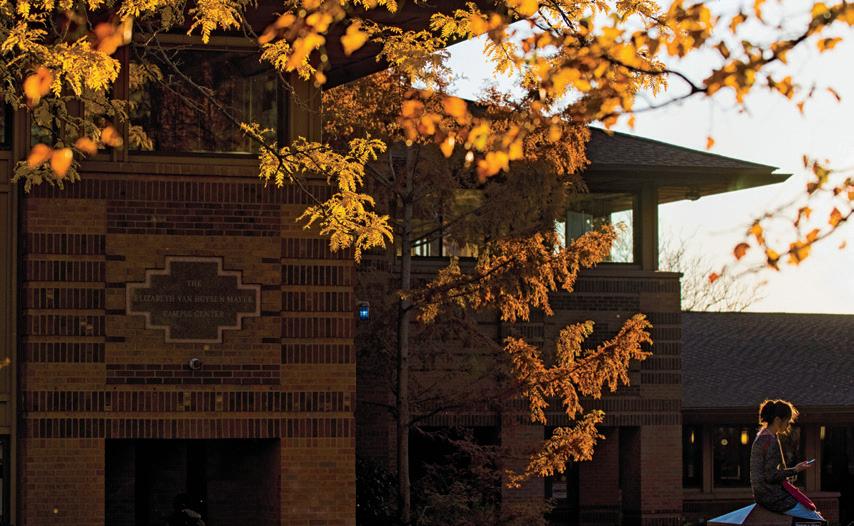
WE DO OUR RESEARCH
Tufts is a student-centered research university, which means that we like to dig into our passions deeply and figure things out for ourselves—whether that involves using silk to regenerate tissue or spending a fully-funded summer exploring the political implications of Shakespeare’s plays through the Summer Scholars program. Students and professors come together, across disciplines, to ask questions and create meaning.
WE ARE ACTIVE CITIZENS
Jumbos use their skills and ideas to better people’s lives, whether they are teaching engineering in local elementary schools, creating sustainable businesses, or spending a semester in Peru or Thailand immersed in social and environmental justice as part of the Tufts Civic Semester. They understand that they are citizens of a global community, and they embrace that responsibility.
WE ARE INTERESTED
…in a lot of things. Tufts students don’t limit themselves: they combine biology with philosophy, compete as nationally-ranked D-III athletes, pursue Bachelor of Fine Arts degrees in studio art at our School of the Museum of Fine Arts, and solve problems as engineers. They’re part of a community that embraces the unconventional and the uncategorizable.
WE DON’T TAKE OURSELVES TOO SERIOUSLY
This is a place where students are as excited to debate fan theories as they are to apply mathematical theorems—as intellectually playful as they are powerful. We believe that ideas can have a profound impact on the world, and those ideas can be born around the seminar table but also in the residence hall common room.
Sound about right? Read the stories here to learn more. Also check out our website: admissions.tufts.edu
Non-Discrimination Statement
Tufts does not discriminate in admissions, employment, or in any of its educational programs or activities on the basis of race, color, national or ethnic origin, ancestry, age, religion or religious creed, disability or handicap, sex or gender (including pregnancy, sexual harassment and other sexual misconduct including acts of sexual violence such as rape, sexual assault, stalking, sexual exploitation, sexual exploitation and coercion, relationship/intimate partner violence and domestic violence), gender identity and/or expression (including a transgender identity), sexual orientation, military or veteran status, genetic information or any other characteristic protected under applicable federal, state or local law. Retaliation is also prohibited. Tufts will comply with state and federal laws such as M.G.L. c. 151B, Title IX, Title VI and Title VII of the Civil Rights Act, the Americans with Disabilities Act, Section 503 and 504 of the Rehabilitation Act of 1973, the Age Discrimination in Employment Act, the Vietnam Era Veterans Readjustment and Rights Act, Executive Order 11246 and other similar laws that prohibit discrimination, all as amended. Tufts is an equal employment opportunity/affirmative action employer. More detailed Tufts policies and procedures on this topic may be found in the OEO Policies and Procedures page.
Any member of the Tufts University community has the right to raise concerns or make a complaint regarding discrimination under this policy without fear of retaliation. Any and all inquiries regarding the application of this statement and related policies may be referred to: Jill Zellmer, MSW, Executive Director of the Office of Equal Opportunity, Title IX and 504 Coordinator, at 617.627.3298 at 196 Boston Avenue, 4th floor, Medford, MA 02155, or at Jill.Zellmer@tufts.edu. Anonymous complaints may also be made by reporting online at: tufts-oeo.ethicspoint.com. As set forth in our
individuals may also file complaints with administrative agencies such as the U.S. Department of Education, Office for Civil Rights (“OCR”). The contact
Rights, Boston Office U.S. Department of Education, 8th Floor, 5 Post Office Square, Boston, MA 02109-3921. The email address
local office of OCR is 617.289.0111 at Office for Civil
for OCR
OCR.Boston@ed.gov.
policies,
information for the
is
JU ST ST A R TIN G YOUR S E A R C H? HERE ’S WHAT TUF T S IS A L L ABO U T. HEY. PHOTO BY ALONSO NICHOLS/TUFTS UNIVERSITY
OFFICE OF UNDERGRADUATE ADMISSIONS
Tufts University
Bendetson Hall
2 The Green Medford, MA 02155-7057
617-627-3170
admissions.tufts.edu
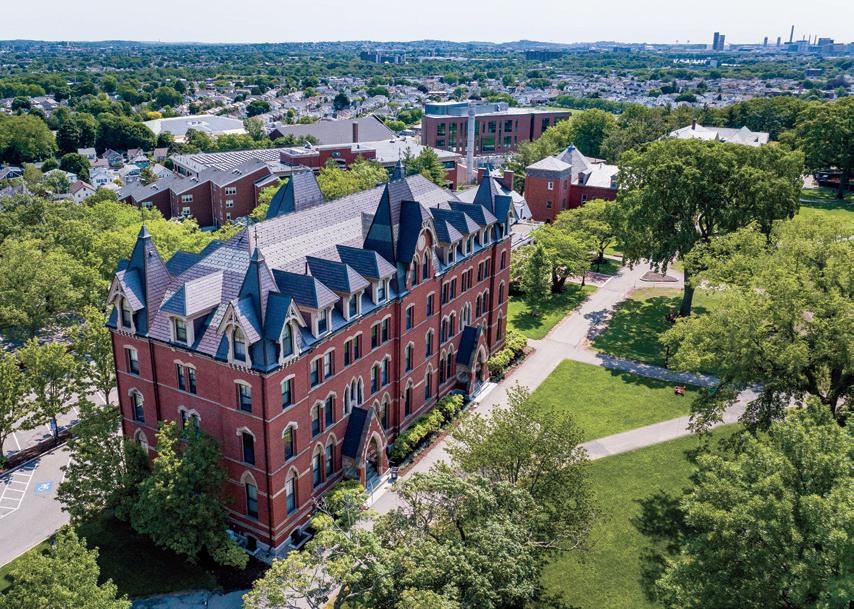
NONPROFIT ORG. U.S. Postage PAID Burlington, VT Permit No. 149
























































